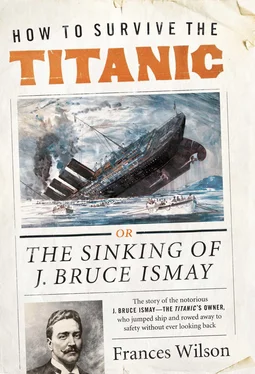The Patna begins to lean; 800 passengers are sleeping: on mats, on prayer carpets, on rough blankets, on bare planks, on decks, in dark corners all over the ship which the crew now believe will sink. There are only seven lifeboats; it is not possible to save everyone and so the Captain, a vulgar and obese German, decides to abandon ship with three of his equally shoddy officers, leaving the human cargo to their fate. The sea is as ‘still as a pond, deadly still, more still than ever sea was before’; the conditions are ‘rare enough to resemble a special arrangement of malevolent providence’ and the crew are struggling like lunatics to release the lifeboat without waking the pilgrims.
Standing apart from them all, Jim has not yet been tested ‘by those events of the sea that show in the light of day the inner worth of a man’. The crew are animals, he has always known that — ‘those men did not belong to the world of heroic adventure’. Jim has always seen himself as separate, as singular; he recognises his superiority. The time has now come to prove himself the man of predestined courage he feels himself to be. This is the moment he has been preparing for since he was a child. But instead of rising to the well-rehearsed occasion, instead of taking the situation in hand, Jim does nothing, says nothing, he has no idea what to do: instead he stands stock-still in a daze on the starboard side of the bridge while the crew struggle with the lifeboat on the port side, expecting at any moment the sea to submerge them all. Should he cut down the other lifeboats so they can float off the ship when she eventually founders, giving some of the passengers a chance to live? Should he wake the pilgrims to tell them that they are about to die? ‘Where was the kindness in making crazy with fright all those people I could not save single-handed — that nothing could save?’ he reasons. Jim delays acting; he is paralysed: all he can think is ‘eight hundred people, seven boats and not enough time, eight hundred people, seven boats and not enough time’. ‘You think me a cur for standing there, but what would you have done?’ he later asks.
The renegade lifeboat is dropping down to the water and the absconding crew, in their sleep suits, are shouting up not for Jim, but for their friend George to join them. George, on the deck, falls down dead from a heart attack. The men in the boat below are calling ‘Jump, George! Jump! Oh, jump!’ It is pitch black, there is a squall approaching; the Patna starts to plunge, and suddenly Jim moves. ‘Something had started him off at last, but of the exact moment, of the cause that tore him out of his immobility, he knew no more than the uprooted tree knows of the wind that laid it low.’ What happens next is against his conscious volition. ‘I had jumped… it seems,’ he recalls. He jumps from a height he can never scale again, he jumps into ‘an everlasting deep hole’, and as he jumps he begins to unravel.
Whatever pushes him off the Patna, Jim now knows that he is not and never will be the man who ‘saw himself saving people from sinking ships, cutting away masts in a hurricane, swimming through surf with a line… always an example of devotion to duty, and as unflinching as a hero in a book’. As the lifeboat pulls away, he listens for the cries of 800 people being ‘pounced upon in the night by a sudden and violent death’, but hears nothing. There is nothing but silence coming from the wreck, and it is too dark to see it go down. It is too dark for the crew to see that it is not George sitting with them in the lifeboat but Jim, and when they realise their friend has been replaced — they do not yet know that George is dead — they accuse Jim of being a coward, and ‘too much of a bloomin’ gentleman’ to help to lower the lifeboat which has now saved his life. ‘Come out of your trance did you?’ one of the engineers mocks, ‘to sneak in? I wonder you had pluck enough to jump. You ain’t wanted here.’ Nor does Jim want to be there; he is not one of them. He thinks about jumping again, this time off the lifeboat and swimming back to the site of the ship to drown alongside the pilgrims, but calms himself with the thought that it will be too late. Around him the crew discuss what they have just done ‘as though they had left behind them nothing but an empty ship’.
A ‘mysterious cable message’ then arrives in Bombay. It contains an ‘ugly fact’, a ghastly joke: by some extraordinary chance, the Patna did not go down but was rescued and towed by a French gunboat to Aden with all her passengers alive, by which point the crew, now on shore, have reported that she ‘sank like lead’. The result is a maritime scandal, and the story will become legendary, a topic of debate in every port and harbour for years to come.
The official inquiry into the case of the Patna is held in August 1883 in a police court in Bombay. Because the Captain and the crew have once again fled, Jim is the only one left to appear in the witness box. ‘I might jump,’ he says, ‘but I don’t run away’, and he stands there defiant; he has done nothing, he tells himself, of which to be ashamed. Crowds fill the courtroom, spellbound by the tall, young, white man; everyone connected with the sea is here, no one has talked of anything but the Patna since the incident became known. They have turned up today not to discover how the ship was damaged; no one is interested in the ship herself — it is assumed that she went over some submerged wreck. They are here to see someone ‘trying to save from the fire his idea of what his moral identity should be’.
The inquiry is the first time Jim has spoken since his jump, and when he answers the questions put to him, questions aiming at facts — ‘as if facts could explain anything!’ — the words he utters appear meaningless to him. Jim feels that he will never speak again. He is tempted to cry out: ‘What’s the good of this, what’s the good!’ when, amongst the myriad faces on the benches below, he catches the intelligent, interested gaze of Captain Marlow, who alone seems aware of the young man’s struggle. Marlow asks him to dinner at the Malabar Hotel that night where, over coffee and cigars, Jim exclaims: ‘I would like somebody to understand — somebody — one person at least! You! Why not you?’ He can never go home now, Jim says; the scandal will have been in all the papers and his father, who has high ideals and fixed moral standards, will not understand. A few days before he boarded the Patna, Jim had received a letter from his father instructing him, from the ‘inviolable shelter of his book-lined, faded and comfortable study’, not to give way to temptation, never ‘do anything which you believe to be wrong’. The parson’s quiet corner of England is as clear and innocent as a child’s gaze. Jim has for ever exiled himself but he cares nothing for that. He is obsessed, Marlow realises, not by what he has lost but by the immensity of what he would have gained had he stayed on board the Patna and become the hero of the hour: ‘Ah! what a chance missed!’ Jim cries, ‘My God! What a chance missed!’
While Jim wants only to get away from his wretched story, Marlow’s interest in his case has just begun. Jim is the loneliest man in the world but he is also, Marlow sees, ‘symbolic’, and he closes in on Jim’s consciousness like a surgeon with a scalpel. He subjects it to the last analysis, he turns it around and around and inside out, he holds it upside down, he takes it apart, he approaches it head on, askance, up close, from a distance; he looks at Jim’s lost opportunity from every possible angle, examines Jim’s future prospects in every available light, wrings out each emotion, gathers alternative perspectives. He weighs to the last scruple Jim’s noble intentions and balances them against his feeble performance, he weeds out what has lain below, unwatched and half-suspected ‘like a snake beneath a stone’, and envelops the whole in a language of exquisite subtlety and precision. Marlow alone sees that when Jim jumps from the Patna he confronts, for the first time, himself. ‘I had jumped… it seems’, Jim says; his jump is a non-jump: a movement of a muscle took place but Jim was not aware of it. It was George and not Jim who was supposed to jump but George had dropped down dead, and for an instant Jim identified himself with the dead man and did what he would have done. Something inside him had jumped, while Jim himself remained still. For the rest of his life, and for the rest of the book, Jim is exorcising, while Marlow examines, this stranger within.
Читать дальше












